Parliament Speaker: No Need to Declare State of Emergency for Now
ZAGREB, March 28, 2020 - Commenting on the possibility of declaring a state of emergency over the outbreak of the coronavirus, Parliament Speaker Gordan Jandroković said on Friday that the parliament would do it if necessary, but that currently other constitutional provisions enabled normal work.
Asked if the government would accept the Opposition's amendments to a bill on the electronic tracking of persons in self-isolation, Jandroković said that he believed the law should not be passed by a two-thirds majority.
The purpose of the law is not to abolish freedoms or curtail democracy, but rather to prevent the spreading of the disease, he said.
The purpose of the law is to protect citizens and their health, but considering the objections, we are trying to reach the broadest possible consensus, and the bill will therefore have to pass a second reading, Jandroković said in an interview with RTL.
As for the Opposition's amendments to the government-sponsored bill, he said: "We'll discuss them. We have taken some time to make the best possible law, but the key issue at the moment is protection of people's health."
As for the possible activation of Article 17 of the Constitution (which concerns restriction of human rights and freedoms in time of war or a major natural disaster), Jandroković said that the Constitutional Court reacts with a report in the event of a breach of the constitution, and that since it did not react to the legal situation at hand, he believes that the constitution was not violated.
For the time being, we have resorted to Article 16 (rights may be restricted only by law and restrictions must be proportionate to the need to protect people's lives), Article 32 (restriction of movement) and Article 50 (restrictions on property or dispossession with compensation, and restriction of entrepreneurial freedoms in exceptional cases) and it will stay so until further notice, Jandroković said among other things.
More coronavirus news can be found in the Lifestyle section.
Croatian Libraries Bringing Collections to Your Home with E-Books
March 28, 2020 - Croatian libraries may have closed their doors, but that doesn’t mean you have to stop reading. A look at the e-book collections available around Croatia.
Looking for more ways to pass the time at home? Croatian libraries have you covered. While their doors may be closed during the coronavirus crisis in Croatia, you can still explore a variety of book collections from the comfort of your home, thanks to the e-books made available.
Here’s a look a part of the offer in Croatia’s three largest cities - Zagreb, Split, and Rijeka.
Zagreb
The National and University Library in Zagreb is allowing everyone interested in heritage and collections of other heritage institutions in Croatia to explore exhibitions as part of the Library’s online exhibitions portal. Three of the exhibitions are available in English (Croatian Glagolitic Heritage, Marko Marulić and Faust Vrančić) and one in German (Marko Marulić).
“The exhibitions present valuable digitised heritage using an interactive approach, while their varied dynamic additional content, such as quizzes and jigsaw puzzles, is aimed at bringing that heritage closer to younger generations. Coordinated by the Library’s Croatian Digital Library Development Division, operating as part of the Croatian Institute for Librarianship, several Library’s departments participate in the preparation of the exhibitions. Technical support is provided by the Library’s IT Department, and, as of recently, the Blue Factory IT company, participating as an outside collaborator,” the National and University Library said on its website.
You can also find a list of digital collections, from old Croatian journals to historic newspapers here. Visit the National and University Library website.
Split
The Marko Marulic Split City Library has recently introduced e-books, making it easy for users to read while library departments are closed.
Those interested will have to download the mobile app ZaKi Book, which is available for free download through the Google Play, Apple store and Microsoft store online. Reading is thus available on Android, iOs and Windows 10 devices.
The application is logged in with a membership number and PIN.
Users can borrow the e-book for 21 days, without the possibility to extend. A member has the right to rent two titles at a time, or a maximum of five titles within one calendar month. The e-books can be read on four devices at a time.
If you do not have a PIN, please contact GKMM by email: This email address is being protected from spambots. You need JavaScript enabled to view it., send your first name, last name and ID number and you will receive it as soon as possible. Visit the Marko Marulic Library website.
Rijeka
While measures are underway to protect and prevent the spread of coronaviruses, the Rijeka City Library is closed until April 14. But thanks to modern technology, library users can also rent books through the ZaKi Book app. There are more than 700 titles available, and there are currently 587 members using the application. The City Library also reports that 1,236 rentals have been made so far: in January 214, in February 446, and in March, for the time being, 576.
The five most-read e-books so far are: "The Highly Sensitive Person: How to Recognize, Understand, and Use the Gift of High Sensitivity" by Elaine A. Aaron, "A Gentleman in Moscow" by Amor Towles, "My Not-So-Perfect Life" by Sophie Kinsela, "Anatomy of Love: A Natural History of Mating, Marriage, and Why We Stray" by Helen Fisher and "20 Steps Forward" by Jorge Bucay. As the director Niko Cvjetkovic pointed out, the Rijeka librarians are active on the web and have prepared a list of recommendations for journalism and fiction, reports Novi List.
Visit the Rijeka City Library website.
To read more about lifestyle in Croatia, follow TCN's dedicated page.
16 Helicopters Available for Fight Against Coronavirus, Says Minister?
ZAGREB, March 27, 2020 - Croatia has 16 helicopters that can help in the fight against the coronavirus if necessary, Defence Minister Damir Krstičević said after visiting a medical camp set up outside Zagreb's KB Dubrava hospital on Friday.
A few days ago, helicopters were tested for landing, the minister said, noting that everything was ready to employ the helicopters if necessary.
As regards members of the 11th Croatian contingent whose repatriation from Afghanistan was delayed due to the situation with the coronavirus, Krstičević said that they would arrive in Croatia late in the evening aboard a Croatia Airlines plane which left Zagreb early Friday morning.
Members of the 12th contingent, who left for Afghanistan in early March, will perform their duties regularly until the end of the mission, after which they will return to Croatia, the minister said.
More news about the coronavirus can be found in the Lifestyle section.
Plenković, Chinese Prime Minister Discuss Procurement of Medical Equipment
ZAGREB, March 27, 2020 - Croatian Prime Minister Andrej Plenković has talked with his Chinese counterpart Li Kequiang about the procurement of medical equipment to fight the coronavirus pandemic.
Plenković said on Twitter on Friday that he and Li also discussed a Chinese donation of equipment, adding that "#EU2020 and China are also discussing cooperation at the level of the health ministries."
We agreed that the cooperation is good, Plenković wrote.
One of the world's largest producers of medical and protective equipment, China is faced with increased orders from numerous countries affected by the pandemic, which started in China at the end of 2019.
A speculative wave on world markets has caused an increase in the prices of protective masks, gloves and testing kits necessary to prevent infection with the coronavirus.
According to official information, 551 people in Croatia are infected with COVID-19 and three have died.
China has reported more than 80,000 cases of infection and nearly 3,300 deaths. As the virus continues to spread around the globe, Beijing is preparing to declare victory and is already relaxing restrictions on movement introduced to curb the spread of the disease.
The borders of Hubei province, the epicentre of the disease, were opened on Wednesday after a two-month blockade.
More news about relations between Croatia and China can be found in the Politics section.
Church Building Promise: How Croatian Parliament Battled 1739 Plague
March 27, 2020 - COVID-19 is not the first unwelcome infectious enemy to come to Croatia, and Vili Beros was not available in yesteryear, so how did the Croatian Parliament battle the 1739 plague? With a promise which was fulfilled just 26 years ago, in 1994.
One of the most interesting stories I have come across in continental Croatia is from the town of Lubreg, about one hour north of Zagreb close to the Hungarian border.
Ludbreg is known in Croatia mostly for its claim to be the centre of the world, but as I discovered on my first visit a few years ago, it actually has another more intriguing claim to fame - it is home to the only certified miracle in Catholic, complete with Papal Bull which you can see in the small museum behind the lovely chapel where the Eucharistic Miracle of Ludbreg took place in 1411.

I have written about the miracle before in detail, so no need to repeat here (you will find more on this link, and on the video below, which is in Croatian only),
But the miracle is only part of the story, and it featured again during the 1739 plague which came to Croatia, extending as far as Brac. As I wasn't here at the time, I checked with Wikipedia on the 1739 plague:
The Great Plague of 1738 was an outbreak of the bubonic plague between 1738–1740 that affected areas in the modern nations of Romania, Hungary, Ukraine, Serbia, Croatia, and Austria. Although no exact figure is available, the epidemic likely killed over 50,000 people.
In February 1738 the plague hit the Banat region, having been spread there by the Imperial Army.
According to the 1740 Hungarian Diet, the Great Plague claimed 36,000 lives.
Southeastern Transylvania may have been the hardest area hit. Over the following eight years, the plague killed a sixth of the population of Timişoara. Timişoara's Monument of the Holy Trinity in Piaţa Unirii is dedicated to the plague's victims. The plague would return to hit the city again in 1762–1763.
Other cities in the region were also stricken. Between October 1737 and April 1738, 111 deaths were reported in Zărneşti, and 70 in Codlea.[2] More than 10% of the population of Cluj-Napoca was reported to have been killed by the pandemic.
The disease's spread extended to the Adriatic. It made its way to the island of Brač in modern-day Croatia.
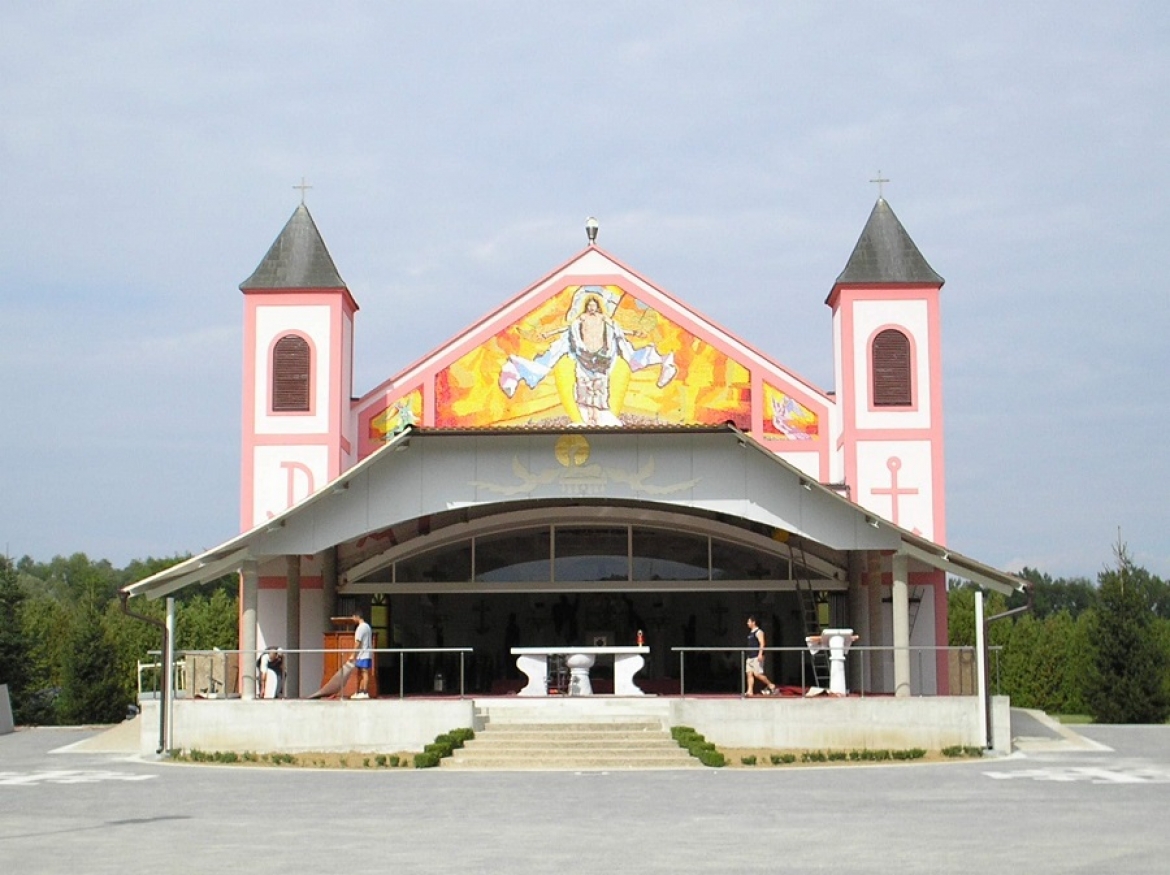
One of the actions undertaken by the Croatian Parliament in the capital of the time, Varazdin, was an undertaking to build a church of thanks in the miracle town of Ludbreg if the plague was stopped, promise which was actually fulfilled only 26 years ago, in 1994, during the Homeland War: According to The Real Presence:
In the 18th century northern Croatia was ravaged by the plague. The people turned to God to call upon His help, and the Croatian Parliament did the same. During the session held on December 15, 1739 in the city of Varazdin, they vowed to build a chapel at Ludbreg in honor of the miracle if the plague ended. The plague was averted, but the promise vow was only fulfilled in 1994, when democracy was restored in Croatia. In 2005 in the votive chapel, the artist Marijan Jakubin painted a large fresco of the Last Supper in which Croatian saints and blesseds were drawn in place of the Apostles. St. John was replaced with Blessed Ivan Merz, who was included among the 18 most important Eucharistic saints in the Church’s history during the Synod of Bishops held in Rome in 2005. In the painting, Christ is holding in His hand a monstrance containing the relic of the Eucharistic miracle.
The church and surrounding park welcomes 100,000 pilgrims in the first week of September each year - see the video above.
And below, in Latin and Croatian, the official documents to fight the 1739 plague.
To follow the latest in the modern-day fight against coronavirus, follow the dedicated TCN section.
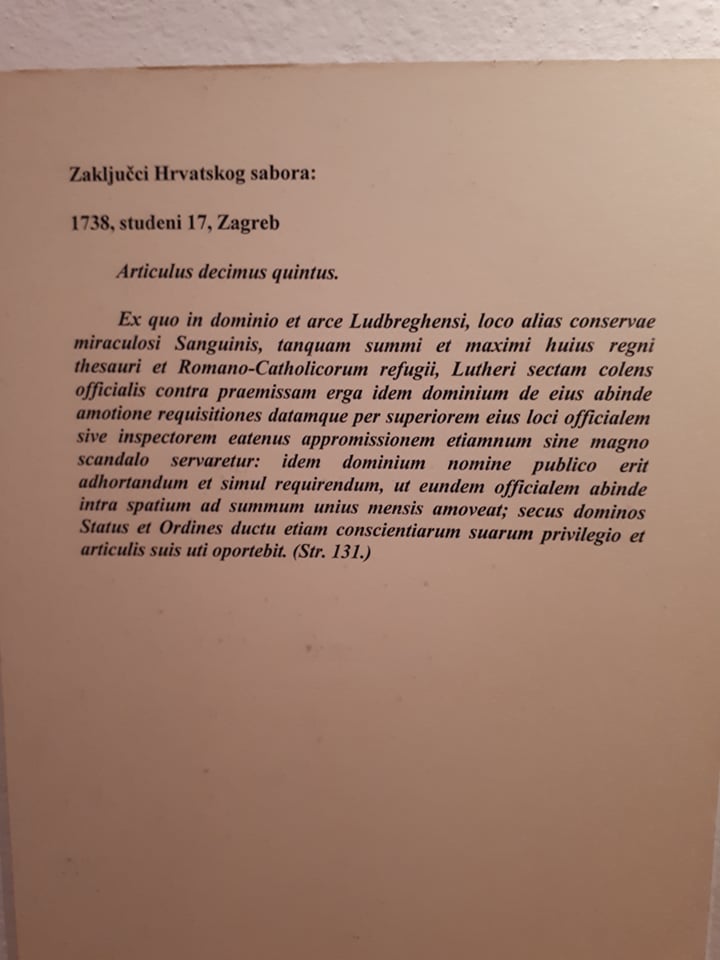
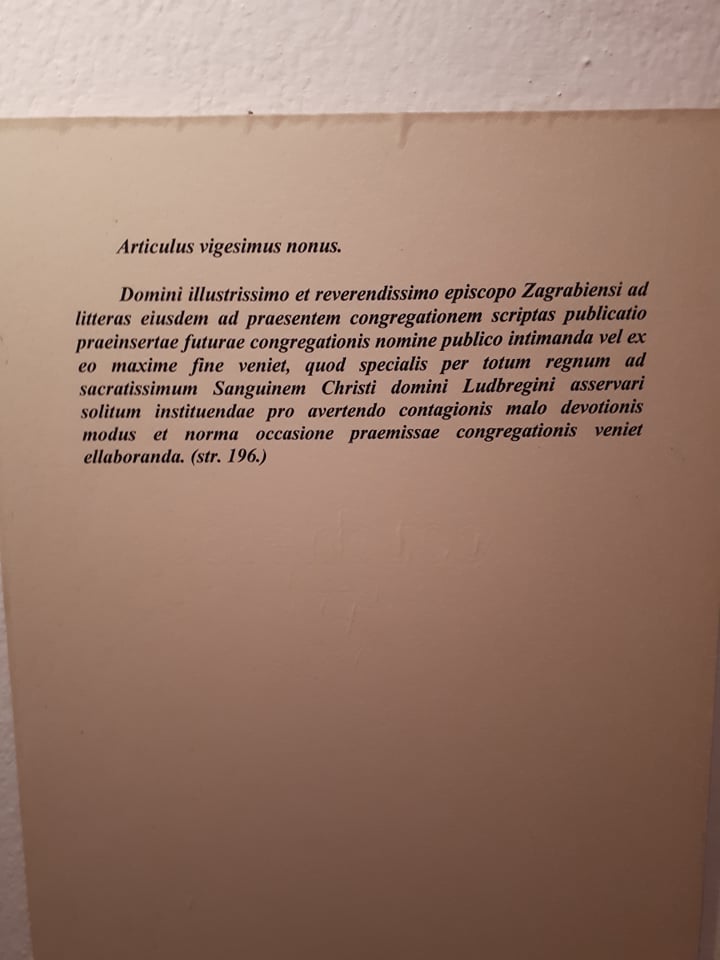
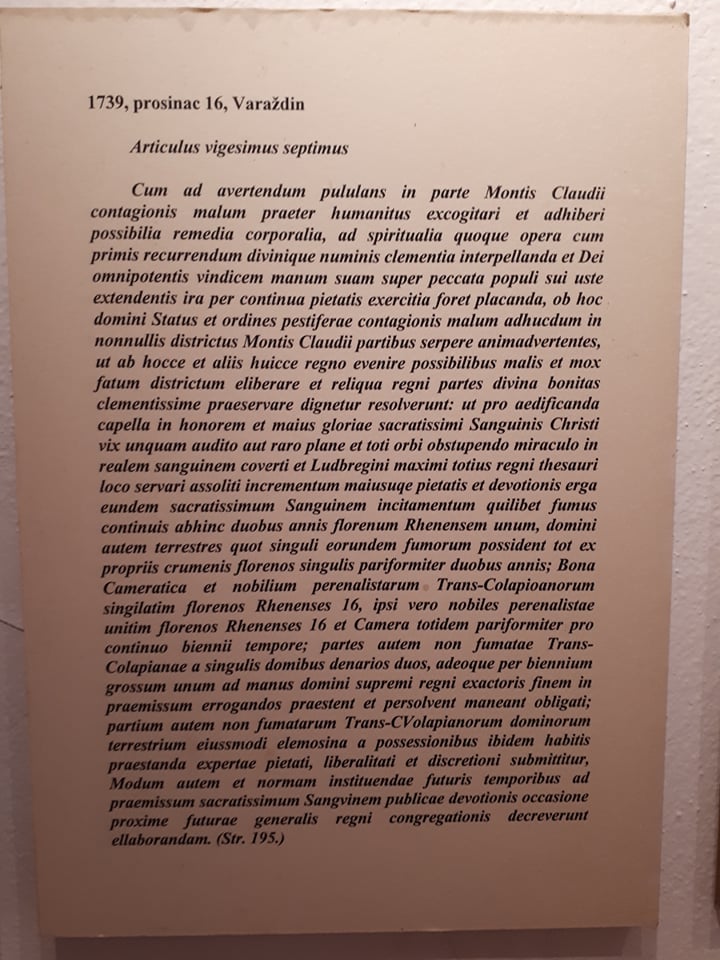
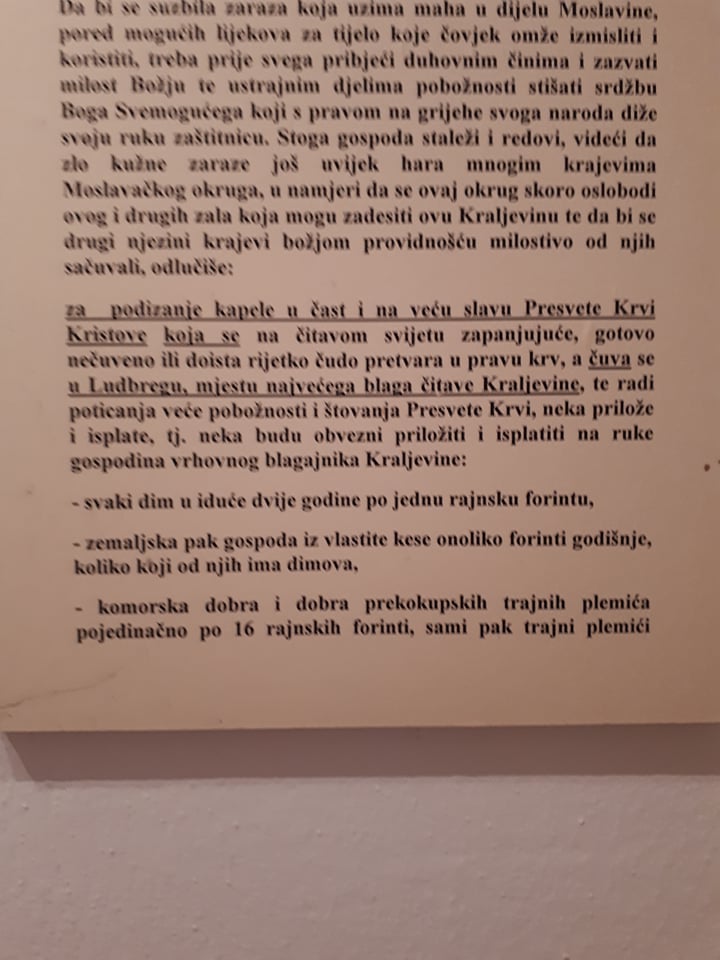
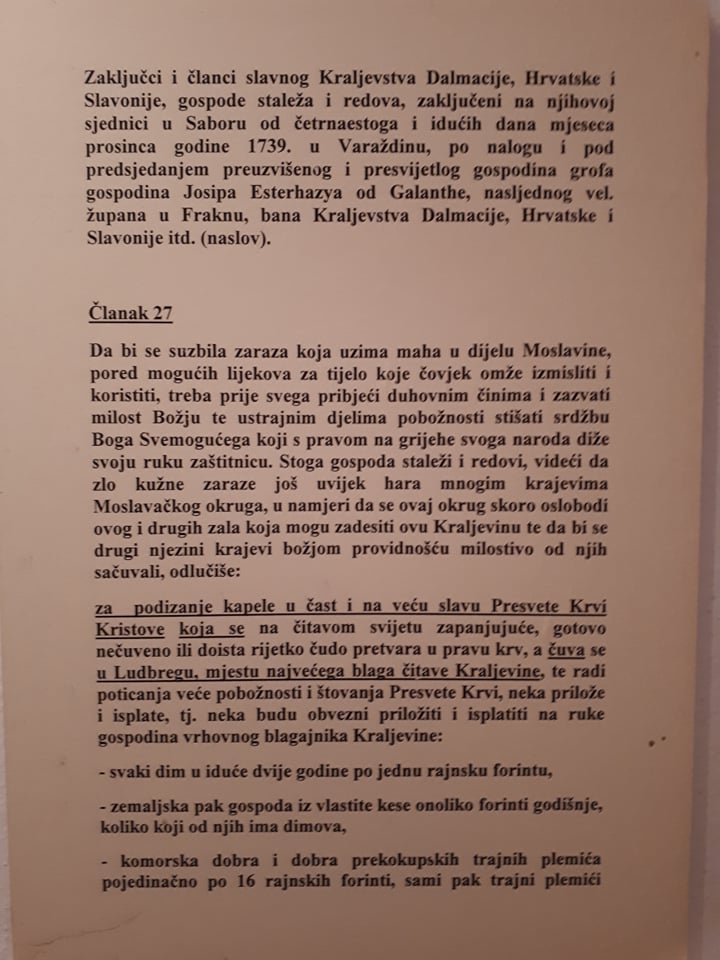

Preparing for COVID-19 in Croatia: R+ Video Tour of Pula Hospital
March 27, 2020 - How prepared is Croatia for COVID-19? Elvis Morina for R+ meets the medical team in the front line in Pula hospital.
There is no question that the Croatian authorities are taking the coronavirus threat seriously. Strict new measures and travel restrictions have come into effect in recent days, and some Oxford University research has placed Croatia at the top of the list in its government response tracker for implementing strict measures.
But how does the situation look in the front line, and who are the front line workers?
A really excellent snapshot of the situation as Pula hospital was posted by the new media outlet, R+, which has been founded by Robert Tomic Zuber and the team from the Rab Film Festival, we well as other partners. You can learn more about R+ here, as well as seeing some of other excellent coronavirus video reporting from Croatia and the region in this previous TCN article.
An interesting - and reassuring - video report by Elvis Morina takes us inside Pula hospital, where reporter Elvis Morina speaks with the medical staff in the front line, and he is also shown the various procedures and facilities there. Helpfully, the video is available with English subtitles.
You can follow the latest TCN coverage of the coronavirus crisis on our dedicated section.
The new portal has some excellent contributions from regional journalists as well, as they document their corona story from their own self-isolation.
One that I found particularly moving was from Marko, a Serbian journalist currently locked down in Madrid
No subtitles to this one but not one I will forget in a hurry.
You can follow the latest additions to the R+ project on the official website here, or follow the YouTube channel.
TCN intends to join the growing number of independent media contribution to Tomic Zuber's project, and we will have our first video on R+ shortly.
Croatian Mathematician Toni Milun Explains Health System Limitations
As Poslovni Dnevnik writes on the 27th of March, 2020, Croatian mathematician Toni Milun has explained just how many people ''can'' get coronavirus, and what the Croatian health system's limits are.
He has emphasised the point that we are the most important part of this story. We have to stick to these measures and not to go outside, and we need to listen only to expert advice and stay at home.
The spread of coronavirus is currently not linear, but exponential. This, in turn, means that it takes the virus about two days to double the number of infections in the world and the number then increases more and more, Toni Milun explained pictorially, on one piece of paper.
We're the most important part of the story. We must adhere to [the measures in place] and not to go outside, we need to listen to the advice of experts and stay home,'' 24sata writes.
''Yes, every day which passes, we're approaching the peak, we have more and more patients. And when we do get some growth, it'll stay like that for a while. When we get to the number of 150 infected people a day, it will be like that for a few days, and then the numbers will start to go down. Of course, if we're careful and listen to the instructions we're given and we continue to not go out,'' he explained.
Our healthcare system has certain limits.
''The worst case scenario would be to skip over our own capacities. We have about 800 respirators in Croatia. If, for example, 16,000 people became ill and about five percent of them needed respiratory assistance in treatment, we'd be on the brink and our system wouldn't be able to handle that,'' Toni Milun said, once again urging everyone to take responsibility in this situation in order for this scenario to not come to pass at all.
Follow our dedicated section for rolling information and updates in English about coronavirus in Croatia.
Restrictions Will Be Alleviated as Long as Infection Growth is Linear
ZAGREB, March 27, 2020 - Interior Minister Davor Božinović said on Friday that as long as the growth of COVID-19 infections was linear, the national civil protection authority would alleviate restrictions so that Croatia could function as much and as optimally as possible in the current extraordinary circumstances.
"Our growth is linear, which indicates that citizens are complying with instructions," he said at a press conference of the national civil protection authority.
Specialised shops which are part of farmers' markets will be allowed to reopen so citizens have more shopping options and to help Croatia's agriculture, the minister said, adding that this referred to shops selling food, hygiene products and animal food as well as agricultural shops.
Stores selling construction materials in the City of Zagreb and Krapina-Zagorje County will also be allowed to reopen to help deal with the effects of the earthquake that struck the Zagreb area last Sunday.
"We'll try to alleviate the measures more and more so that we can respond in the most optimum way to all the challenges of the coronavirus crisis. The new decisions take effect today and it's realistic to expect those shops to reopen tomorrow morning," said Božinović.
Croatian Red Cross executive president Robert Markt urged citizens not to open their door to those asking for money.
"Our volunteers don't ask for money... We provide for about 10,000 families and I'm asking citizens not to see our volunteers as a delivery service," he said at the press conference, urging citizens to report to the police the volunteers who asked for money.
More coronavirus news can be found in the Lifestyle section.
ETUC Calls on Croatia Not to Suspend Labour and Social Rights
ZAGREB, March 27, 2020 - The European Trade Unions Confederation (ETUC) on Friday condemned a possible legislative initiative that would suspend labour and social rights during the coronavirus pandemic and called on Croatia's Prime Minister Andrej Plenković and Labour Minister Josip Aladrović to scrap such proposals.
ETUC reminds the Croatian government of recent warnings by high representatives and bodies of the International Labour Organisation and the Council of Europe that the crisis caused by COVID-19 "should not be used, even temporarily, to dismantle human rights and social rights, in particular trade union and workers’ rights," several Croatian union federations, ETUC members, said in a press release.
"On the contrary, this COVID-19 crisis is a brutal reminder of the importance of ensuring lasting progress with respect to social rights enjoyment and it is in these times that workers and citizens throughout Europe need more social rights and support, not less," ETUC claims.
Human rights can only be derogated from under very strict and limited conditions but for ETUC "it is clear, that by pursuing this initiative, Croatia will be in violation with several of its obligations it has committed to, amongst others, under ILO Conventions, the European Convention of Human Rights and the European Social Charter."
The ETUC is also appalled by the fact that the Croatian government is putting forward such initiatives when holding the Presidency of the EU" because that is "in stark contrast" to the measures being taken by the EU and many EU countries.
ETUC also sent this letter the president of the European Commission, Ursula von der Leyen, Commissioner for Jobs and Social Rights Nicolas Schmit, Secretary-general of the Council of Europe Marija Pejčinović Burić, Commissioner for Human Rights Dunja Mijatović and the president of the European Committee for Social Rights, Giuseppe Palmisano.
Croatia's SSSH and NHS union federations unofficially heard of the government's intention to suspend the incumbent Labour Act and on Wednesday called on the government to refrain from cutting labour and social rights.
The Ministry of Labour and Pension System has confirmed that something is being prepared, however it has denied that this relates to suspending the Labour Act. The ministry did not wish to release any details until it has met with its social partners.
More coronavirus news can be found in the Lifestyle section.
Voice of the Entrepreneur: Are We (They) Ignoring the Reality? Davor Huic Interview
March 27, 2020 - TCN's Aco Momcilovic discusses the economic crisis and lukewarm Croatian government help for the private sector in an interview with Davor Huic, President of LIPA.
The Government has proposed measures that seemed inadequate for most of the entrepreneurs. What could they expect and hope at the moment?
It seems that the government has grossly underestimated the gravity of the economic crisis that may hit Croatia following the coronavirus epidemic. They apparently put a vast amount of resources, energy and time into planning and carrying out the fight against the virus, but have not addressed the issue of the economy with a commensurable vigour and commitment. That is why the reaction of the public at large to the way the government is handling the crisis has been overwhelmingly positive. On the other hand, the reaction of stakeholders (businesses) to the government’s economic package was met with resistance and opposition. Now, they have realised this, and I expect them to put more effort into managing the economic part of the crisis – form an expert team to advise them on the subject, and propose the second round of measures, that will be more aggressive.
Unlike the new Health Minister Vili Beros, the general opinion about Minister of the Economy, Darko Horvat, is that he is doing a terrible job and that he is not equipped for the task at hand. What are the chances that he will be relieved of his duty, or what kind of even bigger mistakes does he need to do before he gets fired?
I think calls for resignation are a part of the strategy to put more pressure on the government to improve on its relief package, so I will not comment on its merit. But it is obvious that Minister Horvat will come under increased pressure to take a more business-friendly stance within the government and to refrain from some of the rhetoric that has plagued his latest public appearances.
The Government is acting like jobs in the private and public sectors are not connected and dependant. Could they maintain the status quo in the public sector long enough to reach the election?
The government has sent conflicting signals about its position on cuts in the public sector. But it is more or less clear to anyone who follows the situation that these cuts are inevitable. The size of the relief package put against our fiscal capacity is such that the operation of “saving private Ryan”, that is the Croatian private sector, will demand a reshuffling of the central budget, with public sector wages as the most obvious area with great potential reserves.
What percentage of Croatian entrepreneurs, and in general employees, are underestimating the current situation or the length of this crisis? What could we do to educate them and warn them about the hard times that are in front of us? How could The Voice of the Entrepreneur Initiative contribute?
I do not think that many Croatian entrepreneurs underestimate the crisis. I think many other people did but not entrepreneurs. Unlike many people whose salaries “arrive” on time every month with reassuring regularity, notably public servants and politicians, business people understand the concept of cashflow, and know all too well the sinking feeling of liabilities mounting while income comes to an abrupt halt. As for the length of the crisis, and its impact on the economy, there are still no good forecasts. It all depends on the length of the lock-down, but even in the best-case scenario, the losses to the economy could be enormous. Some conservative estimates predict a drop in output comparable, or bigger, to that in 2009.
Countries in the region are openly stating that they will channel all of their efforts in the saving of the private sector. Only in Croatia it seems that politicians are concerned (at least according to their measures) only about the public sector. What is the reason for that? Are we the biggest, old school socialist country on the Balkans?
The jury is still out on this one. We are still waiting to see the second part of the relief package, which the government has promised to propose soon (perhaps as early as next week), to determine which route they choose – saving the public sector and letting the private go down the drain, or a more balanced approach, with more aggressive measures aimed at saving jobs in the private sector but risking some cuts in the public sector as well. The problem, of course, lies in the fact that this is traditionally very difficult to pull off, especially for a government facing elections in six months. But the depth and the size of the crisis opens a clear space for the government to do the right thing.
What is the role of organizes associations of employers, state connected (HGK) or voluntary (HUP)? Is this the time for them to prove their value, and what should be the consequences if they fail in doing so?
Well, they also came under some pressure from entrepreneurs to prove their value. You pay contributions for years, and then when a crisis comes from nowhere and the government offers a lukewarm reaction, they side with the government. Both HGK and HUP have not been aggressive enough in protecting the private sector the free market principles and liberal values. This has to change, and if they do not clean their act and become a more vociferous advocate of the private sector, the will lose all their legitimacy. I think they have understood this, since they have changed their tone and became more aggressive under the pressure from their “base”.
You can connect with Davor Huic via LinkedIn.
You can connect with Aco Momcilovic via LinkedIn.
For the latest on the coronavirus crisis in Croatia, follow the dedicated TCN section.

